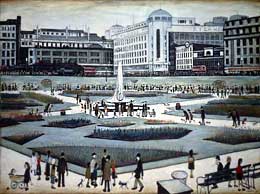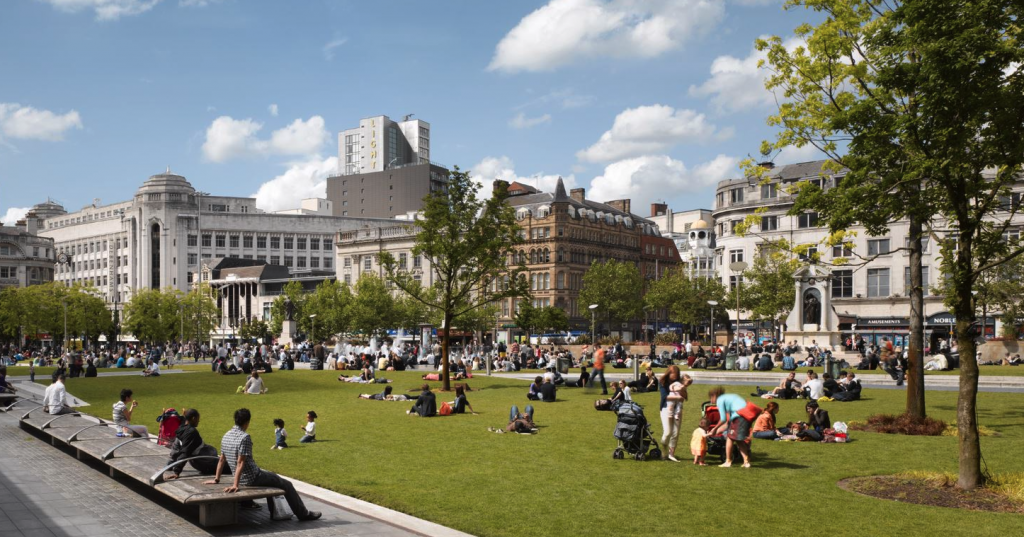

A few interesting facts about Piccadilly Gardens:
• In 1763 is housed the Manchester Royal Lunatic Asylum- a precursor of the modern psychiatric hospital.
• In the 1850s statues of noted figures were raised to include Sir Robert Peel- the father of modern policing. One of his ideas was: “The key to preventing crime is earning public support. Every community member must share the responsibility of preventing crime, as if they were all volunteer members of the force. They will only accept this responsibility if the community supports and trusts the police.”
• In the 1930s the area was landscaped and a sunken garden was laid out on the footprint of the former hospital basement, with formal flower beds, a rose garden and flowering cherry trees.
• In 1945 many buildings around were destroyed by Luftwaffe during the Manchester Blitz.
• In 1954 L.S. Lowry has captured Piccadilly Gardens in his famous oil painting that can be admired in the City Art Gallery on Mosley Street. The song about L.S. Lowry painting matchstalk men and cats and dogs is catchy!
• In 1996 the IRA detonated a 1,500-kilogram lorry bomb in the centre of Manchester. It was the biggest bomb detonated in Great Britain since the Second World War. Manchester City Council initiated an international competition for the redesign of Piccadilly Gardens. The landscape architects EDAW redeveloped the gardens between 2001 and 2003.
• In 2003 the Piccadilly Gardens project was shortlisted for the British Construction Industry Awards.
Since then, problems subsequently emerged with the redesigned gardens. The area is frequently criticised and described as heaven for drug users, a magnet for social problems, the square that shames the city etc
The history of Piccadilly Gardens features on Wikipedia. Its most recent chapter, the 2021 design competition, explains the need for redesign by the ongoing problems with antisocial behaviour and the public response to the 2003 landscaping.
In her comment to the announcement, the Manchester City Council Leader Cllr Bev Craig said:
“We know that people have strong views about Piccadilly Gardens and serious work is continuing to realise its potential as an outstanding, welcoming public space – somewhere people want to linger and enjoy, not just pass through.
There’s still much more work to do and today is not about us announcing the plan but appointing the experts who will help produce one, taking the views of Mancunians very much into account.”
We are proud and excited to have won the competition. At the same time, we feel the weight of responsibility we have been given by the Manchester City Council and LDA Design. We intend to apply innovative thinking and the best practice in crime prevention through environmental design (CPTED) to improve the quality of the space. A project of such prominence will have a significant impact on the local community and the way Manchester is perceived by the visitors. We’ll do our utmost best to help create a top-quality public space for everyone to enjoy.
We look forward to writing the next chapter for the Piccadilly Gardens!
